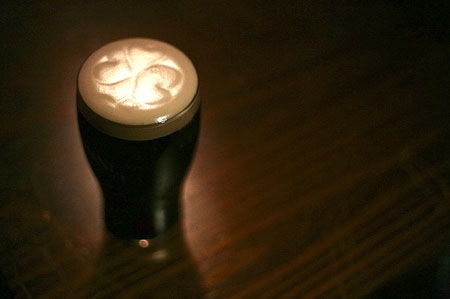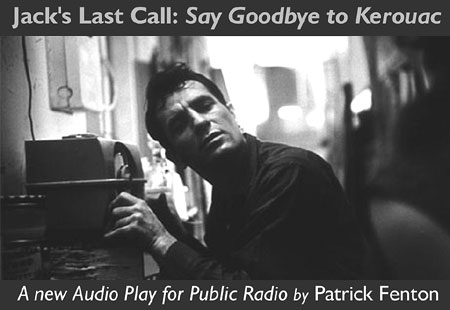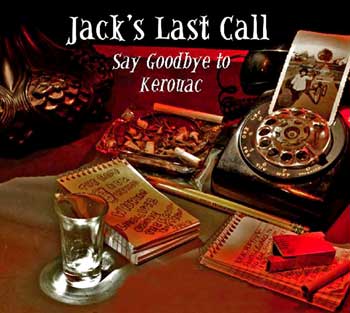Patrick
Fenton

Drinking a pint with Behan and Kerouac
Last
year was the 50th anniversary of the publishing of Jack Kerouac’s classic,
American novel “On the Road,” and considering all the ballyhoo that
has rightfully been going on it seems fitting to talk about the strong influence
he had on so many Irish writers, and also in the case of James Joyce, the influence
they had on him.
The most obvious Joycean influence on Kerouac’s
writing is, perhaps, in his novel, “Big Sur,” a book that, like most
of his work, walks the line between fiction and the real world around him that
he recorded so diligently in his note books each day of his life. If someone ever
figured the math out on paper, it would seem like he spent half of his life traveling,
and the other half sitting in a lonely room over a drug store in Ozone Park, Queens
writing books about what he saw. Hard to believe, but he lived in the conservative
borough of Queens for 12 years, from 1943 to 1955; the longest he ever lived anywhere.
He would occasionally take breaks from this solitude to walk across the street
to an Irish bar on the corner of Cross Bay Boulevard and 133rd Avenue. There is
no evidence that anyone who drank in the bar at the time knew who he was, or that
he was sitting up in his kitchen across the street planning his legendary “On
the Road” journey. The bar, which has changed hands several times since Kerouac
drank tap beer there with his father, and Beat friends like Lucien Carr, is still
there. Today it is called Glen Patrick’s Pub.
When I first visited
it in the fall of 1989 while working on a story for New York Newsday, there was
an old “American” shuffleboard table to the right of the bar as you
walked in. I could picture him and Neal Cassady, who used to visit him often in
Ozone Park, drinking beer and playing shuffle board, Neal’s shiny, brand
new, 1949 Green Hudson parked outside.
Not too long after September 1957
when “On the Road” was finally published - seven years after Kerouac
had written several versions including one published posthumously as “Visions
of Cody” - he finally found fame. Shortly thereafter, he fled to Northport,
Long Island to escape the wild nights of New York City’s Greenwich Village
and a title that he loathed, “The King of the Beats.” With his mother
watching over him, he tried to settle down in this small suburban, seaside town,
only occasionally taking trips back to New York City.
In 1960, looking
to escape from public view even more, Kerouac accepted an invitation from Lawrence
Ferlinghetti to spend some time in a deserted cabin he owned in Big Sur, California.
Much of the book that came out of that experience is about the several weeks Kerouac
spent in a small wooden cabin located at the bottom of a desolate canyon at Big
Sur. In the solitary weeks that he stayed there, night after night trying to record
- in Finnegan’s Wake style - prose to the sounds of the crashing waves while
drinking cheap wine, he came very close to losing his mind.
“Tiresome
old sea, aint you sick
and tired of all this merde?
This incessant boom
boom
and sand walk—you people
hoary rockies here to Fuegie...
No
Monarch’d ever Irish be?
Ju see the Irish sea?
Green winds on tamarack
vines–
Joyce—James—Shhish—
Sea--------Ssssss-----see
--------mnavash
la vache....”
His friends eventually got him back
to Northport, Long Island and, after a few weeks of sitting alone in the back
corner of Peter Gunther’s Bar on Main Street, downing whiskey and beer, he
started to pull himself together. The next summer he sat down, and in the same
way he wrote “On the Road,” he banged out his story “Big Sur”
on a long roll of teletype paper, singled spaced. After mulling it around for
a year, he completed the book in ten days and ended it with a long Joycean poem
entitled, “Sea.”
He was greatly influenced by Irish writers,
particularly Joyce, but his own influence ran all the way from Brendan Behan to
Van Morrison. Behan once said, after meeting him in Greenwich Village, “The
most controversial person I met in the Village was Jack Kerouac, the novelist.
Although he did not live there, he would come over quite often to meet his friends,
have a drink and try to take the micky out of visiting Irish playwrights, which
I may say he did not find a very profitable occupation . . . But he is a professional
writer like myself, and a good one.” Kerouac later said of the meeting that
the Irish writer was one of the few men he ever met that could out talk him.
In two of his songs, “Cleaning Windows,” and “On Hyndford
Street,” Van Morrison pays tribute to Jack Kerouac:
....“Going
up the Castlereagh hills
And the Cregagh glens in summer and coming back
To
Hyndford Street, feeling wondrous and lit up inside
With a sense of everlasting
life
And reading Mr. Jelly Roll and Big Bill Broonzy
And ‘Really The
Blues’ by Mezz Mezzrow
And ‘Dharma Bums’ by Jack Kerouac
Over
and over again . . .
John T. Davis, the Belfast film
maker noted for, “Shell Shock Rock,” his 1979 film on the Punk Rock
scene in Northern Ireland, often said in interviews that he was heavily influenced
by the work of Jack Kerouac. Others, like Dublin born writer, James Liddy wrote
in his autobiography, “The Doctor’s House,” how Jack Kerouac had
such a strong influence on him that he once dedicated one of his stories to him.
Another Dublin born writer, Colum McCann, said in an interview that “from
a young age he had imagined the America of Jack Kerouac.”
Recently,
when I talked to Colum on my radio show broadcast in Long Island, I brought up
Kerouac. We were talking about his new book,” Zoli.” You can see the
influence of Kerouac in his stories, that fine detail he paints in making you
feel that you are walking down the street with one of his characters, that whole
sense of place and the bellow of life that Kerouac caught so well.”
“I would love for the ghost of Zoli and Jack Kerouac to get together and
sit down for an afternoon,“ he said. We both laughed, but it's interesting
to note that all these years after his death, Kerouac is still such a strong reference
point for Irish writers.
At the very end of his last book, “Vanity
of Duluoz" (less fiction than memoir) Kerouac wrote . .
“I
did it all, I wrote the book, I stalked the streets of life, of Manhattan, of
Long Island, stalked thru 1,183 pages of my first novel, sold the book, got an
advance, whooped, hallelujah’d, went on, did everything you’re supposed
to do in life. But nothing ever came of it.“
Jack
Kerouac died broke in St. Petersburg, Florida in 1969. He was 47 years old. The
doctors said he literally drank himself to death. He would never know that in
2001, a man named Jim Irsay, a football team owner, would buy his original, unedited
manuscript of “On the Road,” a long 120 foot scroll that he made by
taping pieces of teletype paper together, for $2.43 million dollars. Nor would
he ever know that in March of 2009, the scroll is scheduled to be exhibited at
University College in James Joyce’s home town, Dublin, Ireland.
About
the Author Writer, Author and Playwright, Patrick
Fenton, the son of Irish immigrants, was born in the Irish working-class
tenements of Windsor Terrace, Brooklyn on St Patrick's Day, 1941.
As
a writer, Fenton's stories and articles have appeared in numerous publications
including the New York Times, New York Newsday, New York Magazine
and The Daily News. As a noted Kerouac scholar, Fenton's stories, "The
Wizard of Ozone Park" and "Drinking
With Jack Kerouac in a Rockaway Bar" are eclectic bookend
perspectives of the great American author and his stories "Confessions
of a Working Stiff" and "Stoopdreamer
and Other Brooklyn Stories" a roadmap of his coming of age
as a NYC Irish-American blue-collar Joe.
As
a Playwright, Fenton's "Jack's
Last Call: Say Goodbye to Kerouac"
is a poignant look at Jack Kerouasc's last days in Newport, LI as he wrestled
with his misconstrued career. Click
Here To Learn More About "Jack's
Last Call: Say Goodbye to Kerouac."
Now
Playing on PRX!

News,
New & Of Note! - "Jack's Last Call:
Say Goodbye to Kerouac" premieres on PRX -
The AudioPlay adaptation of the Patrick Fenton StagePlay, "Kerouac's
Last Call" premiered April 2, 2008 on PRX
- the Public Radio Exchange.

Click
Here To Learn More and Listen to Jack's
Last Call: Say Goodbye to Kerouac."
Also
Of Note . . .
Click
Here To View Going
Home - Squaring the Irish Circle
- A poem by Patrick Fenton
Click
Here To View Almost
Home from
"Stoopdreamer
& Other Brooklyn Stories"

